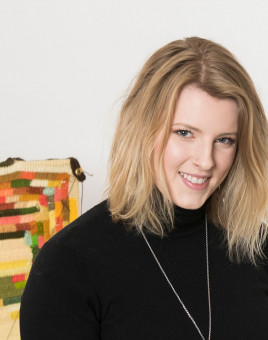
Tessa Turner
Program / Year
Art Therapy ’20
Hometown
Cedar Rapids, Iowa
What led you to enroll at Lewis and Clark's Graduate School of Education and Counseling?
I was part of the teach-out program from Marylhurst. I. Had completed one year of the program prior to the closure.
Who or what inspired you to pursue your chosen field of study?
I have experimented with art materials since I can remember. I have always loved the tactile engagement that comes with art-making, but also had a deep desire to give back to the community and help those in need of healing. After an advisor told me about Art Therapy in my sophomore year of undergrad, I curated my coursework to lead me towards my master’s in art therapy.
What does social justice mean to you?
As a white woman from a lower, middle-class family, I believe it is my duty to use my privilege within society to promote equality and power for those within marginalized communities.
How do you hope to apply your social justice education in your chosen career?
I hope to work as an Art Therapist within the community where I can use my education and position of power as an agent of positive change.
Where have you been working/interning as a student, and what does that work entail?
I am placed at MacLaren Youth Correctional Facility down in Woodburn, OR. I lead art groups with incarcerated young men aged 12-25 years old once per week.
What is the most fun part of your program?
Art-making and intellectually engaging with my peers and professors.
What is the hardest part of your program?
The closure of Marylhurst and transition to Lewis & Clark was the hardest 2 months I’ve experienced in my recent history.
How would you describe your graduate school experience in one sentence?
The Art Therapy program has changed my life for the better.
Who has been your most influential professor, and why?
Kris Bella has pushed me to look introspectively; at the parts of myself that I wanted to keep in the shadows, as well as at the parts that are strong and powerful. She has taught me how to be a dynamic and authentic prospective Art Therapist, and and lean into my discomfort in order to learn more about myself and the implications of my lived experiences on my future clients.
What is a unique perspective you bring to your cohort?
I am from the MidWest, living and learning in the NorthWest, which helps me bring a new perspective to those who have never experienced where I am from. This could help inform interactions for future clients who could be from the MidWest.
What career will you be pursuing after graduation? Did you intend for this to be your career path when you enrolled?
I intend to become an Art Therapist.
Describe an "ah-ha" or "right-turn" moment you have experienced here - a time when your perspective, opinion, outlook, or goals changed suddenly due to a specific experience.
The closure of Marylhurst and the transition to Lewis & Clark was an incredibly difficult experience for myself and our cohort/staff alike. It was ironic that we were learning about collective trauma in our Adult Psychopathology class when we got the news about the closure, as it was highly relevant to our new experience/journey into the unknown at the time. The confusion, deep anger, and sadness propelled us forward to make a place for ourselves, and for that I will be forever grateful for Mary Andrus’ fearless leadership to Lewis & Clark. We would not accept failure and here we are, almost a year later; thriving.
What do you think of Portland?
I love the moss!
Graduate School of Education and Counseling is located in Rogers Hall.
MSC: 93
email graddean@lclark.edu
voice 503-768-6000
Dean Scott Fletcher
Graduate School of Education and Counseling
Lewis & Clark
615 S. Palatine Hill Road MSC 93
Portland OR 97219